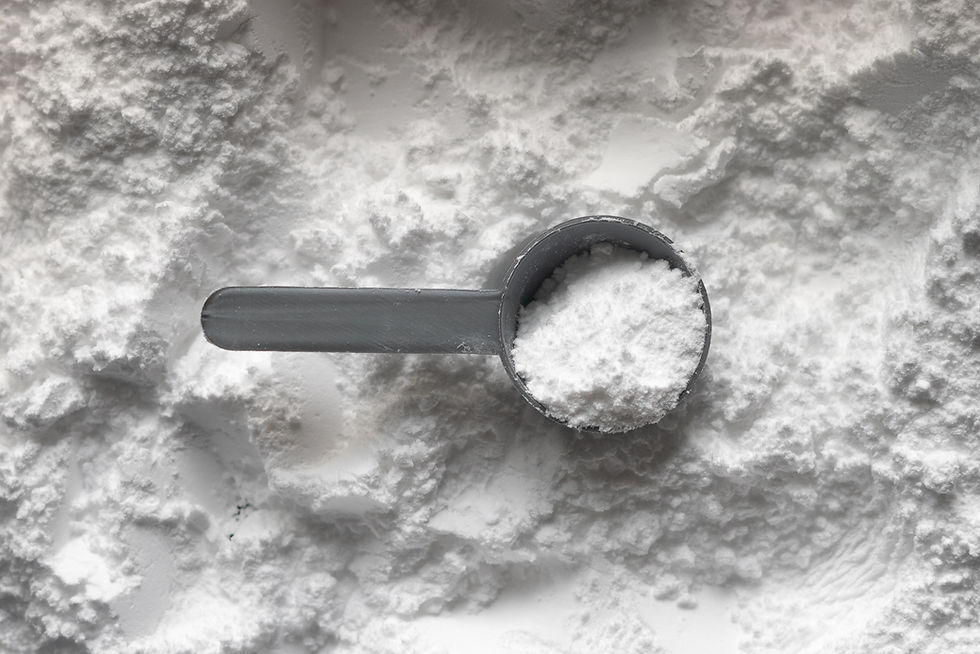My Favorite Supplement: Creatine
- Javier Coronel
- Jan 3, 2022
- 3 min read
Updated: Jan 15, 2022
When it comes to supplements, the majority of them are nothing more than marketing gimmicks looking to take a part of your hard earned money. For that reason I am always very meticulous on what I recommend people to actually spend money on when they come to me looking for advice on supplements to take. Creatine has been a staple of my supplement stack practically since the start due to its scientifically proven effectiveness and efficiency. Scientific support on this statement can be found here: https://pubmed.ncbi.nlm.nih.gov/12701815/.

What exactly is creatine though?
Creatine is a substance that can be found in your body in small doses. Around 90% of the creatine within your body is stored within muscle cells with the remainder being in your brain, kidneys, and liver.
Why would you need to supplement Creatine if it's already found in the body? Simple. The amount of Creatine naturally found in your body or obtained from food is an insufficient amount to get the benefits of creatine. In order to get the amount of creatine in your system to see any benefits there is no real option other than supplementation as it is the most cost efficient and logical option.
What benefits will you get from creatine supplementation?
While there are a variety of benefits that have been found linked to creatine supplementation, the main ones I focus on are a slight increase in energy and strength. This is due to creatine supplementation causing an increase in phosphocreatine store in your muscles. These benefits result in an increase in muscle mass as the strength increase helps you add additional stress on your muscles. For example, a slight strength increase due to creatine can result in your dumbbell bicep curl changing from 20lb on each arm for 3 sets of 10 to 22.5lbs on each arm for 3 sets of 10. This means you have gained an additional 2.5lbs of stress per rep just from creatine supplementation.
For those slightly more curious about the energy side than the strength side, this is attributed to the fact that creatine helps in the creation of ATP, which is consumed during high-intensity exercises.
As I mentioned earlier, there are other benefits connected to creatine but due to their personal health related nature, I will refrain from speaking on that as I advise everyone to talk to their primary healthcare provider for this sort of information. I will say that its health benefits are related to neurological conditions for the most part which you can read more about here:
Type of Creatine:
The supplement industry will unfortunately always be plagued with dirty actors trying to sell you on their "new formulas" or "proprietary blends" but I'm here to tell you that the majority of it is BS. I've seen so many "new" types of creatine being marketed by different supplement companies and I'm here to tell you that the most effective type creatine monohydrate. As long as you are consuming that type of creatine you can feel confident in knowing you're making good use of your time and money.
How Much Creatine Per Day?
5 grams.
Overview:
Creatine is a safe and efficient supplement that I would not hesitate to recommend to anyone. It helps increase energy production by increasing ATP and helps with muscle growth by contributing to progressive overload. It can be taken for long periods at a time and is one of the cheapest supplements you can invest in. The recommended form of creatine is creatine monohydrate. While there are no serious side effects worth mentioning, I will say that due to the manner in how creatine is primarily stores in the muscles, creatine supplementation will cause you to retain water more than normal. This is not a real concern for the most part but you may notice you are "bloated" so I wanted to point that in the instance that you decide to try creatine after this. If you have any further questions please leave a comment or reach out and until the next article, I wish you all nothing but the best.
Let's make the most out of 2022.

Comments